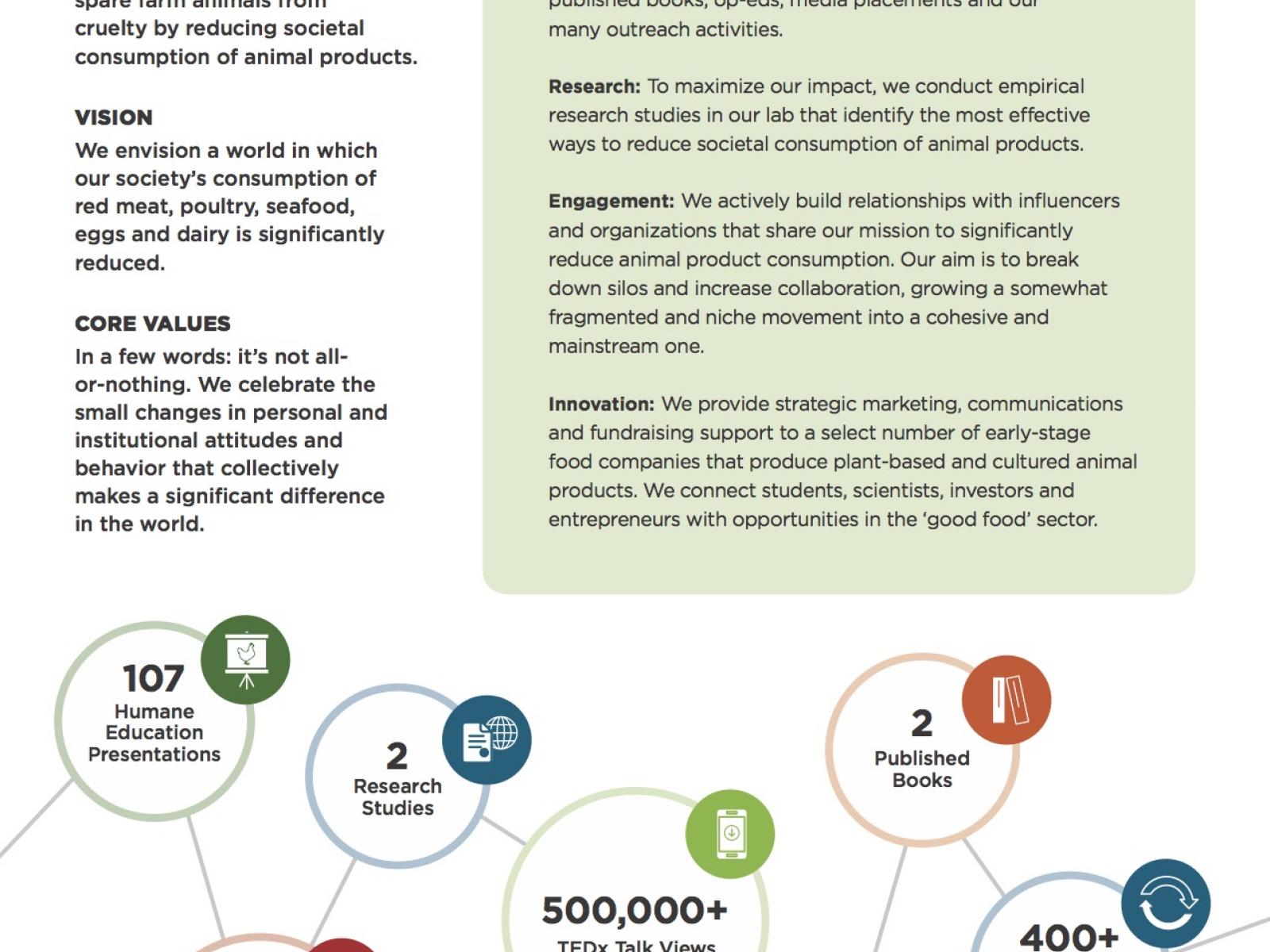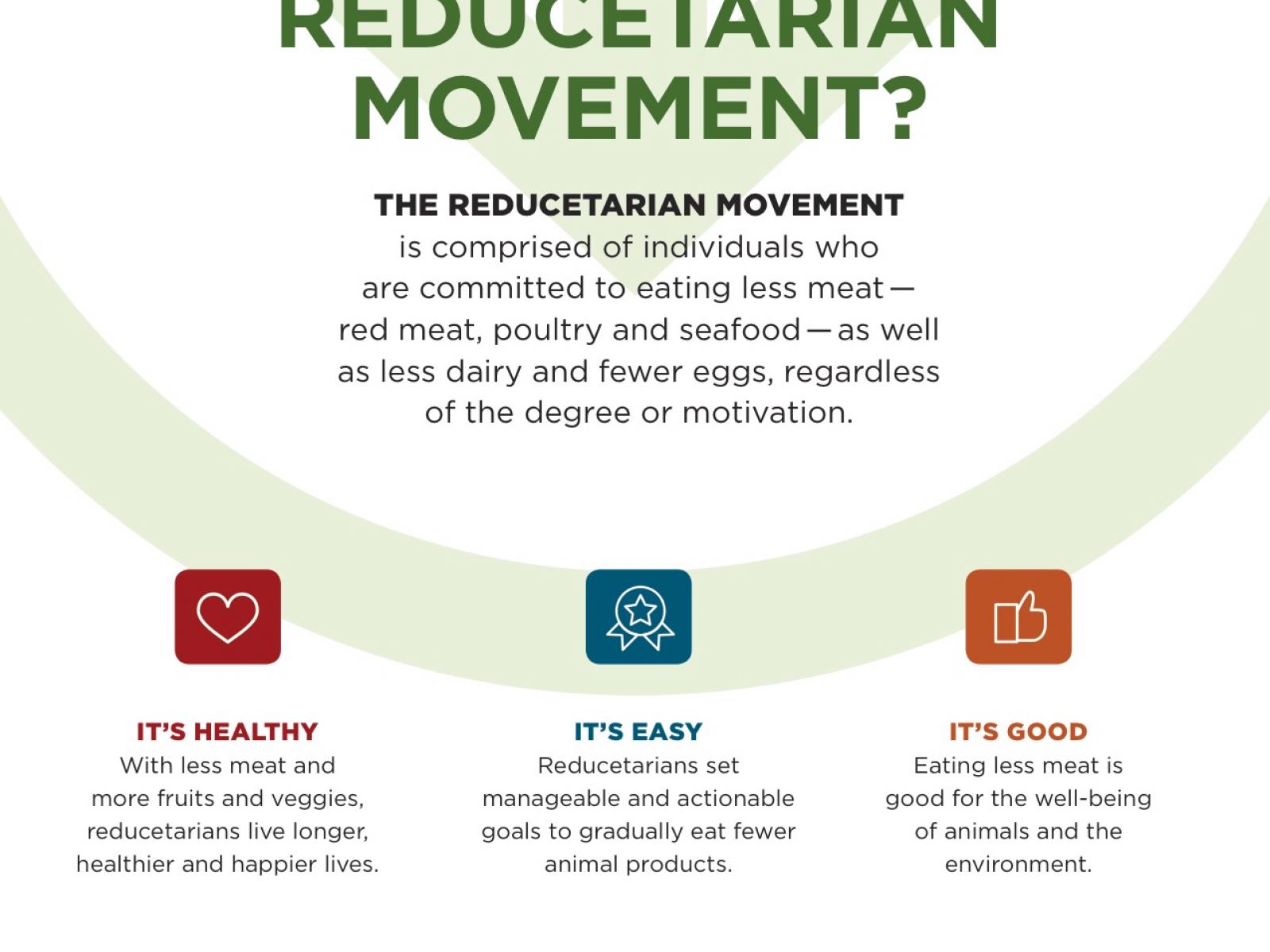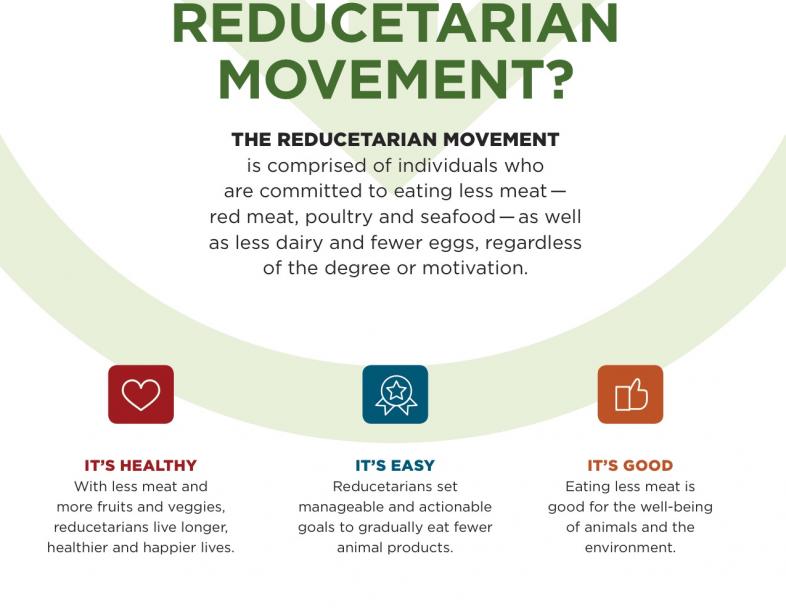An Overview Of Our Solution
Meat consumption in the United States and globally is on the rise. The primary way in which we produce this meat is accelerating climate change at unprecedented rates. To mitigate climate change, we must reduce societal consumption of animal products. One major challenge to doing so is that most people view meat consumption as an all-or-nothing premise (i.e. you're either a vegan or omnivore). With few people interested in veganism, we must find a way to empower people to reduce the amount of animal products they consume. One opportunity to advance this goal is to spread the "reducetarian" - a person committed to eating less meat - red meat, poultry, and seafood - as well as less dairy and fewer eggs, regardless of the degree or motivation - concept through a unique combination of education, outreach, and engagement campaigns.
- Population Impacted: 10,000,000
- Continent: North America
Context Analysis
Simply put, Americans are eating over 200 pounds of meat ever year. To put this number in perspective, my parents’ parents likely ate what the average American ate in 1950—approximately 170 pounds of meat annually. Research suggests a similar trend in the United Kingdom, with the average citizen eating 185 pounds of meat today and 140 pounds in 1950. Meat consumption has been on the rise in developing countries too. In 1982, the average person in China ate just 30 pounds of meat; today, the average per eats 140 pounds of meat.
Describe the technical solution you wanted the target audience to adopt
Our aim to establish the reducetarian identity in the mind of consumers. A person incorporates collections of beliefs across all kinds of elements—academic performance, gender roles, sexuality, race —into his or her sense of self, and that these beliefs in turn cause them to take actions that they view to be consistent with these identities. More specific labels like “reducetarian” can help people stick to their food choices by making them feel like part of a community.
Type of intervention
Describe your behavioral intervention
Our aim is to change consumer food choices such that they select a plant-based meal more often than a meaty meal. To ensure our desired behavior, we established the "Reducetarian Lab," the research arm of the Reducetarian Foundation. The Reducetarian Lab conducts first-rate scientific studies on the relative effectiveness of various messages (i.e. eat less meat, go vegetarian, go vegan, etc.), framings (health, environmental, animal rights, etc.) and modes of delivery (videos, leaflets, articles, etc.). At RF, in the spirit of "effective altruism," we are committed to 1) revising our strategies in accordance with these results and to 2) making these results publicly available for the benefit of the entire community. Our first study demonstrated the effect of a news article encouraging the reduction of meat consumption on individual meat consumption. In particular, it examined the effect over a long period of time (5 weeks), suggesting that the effect of reading a news article can be sustained for several weeks.
As needed, please explain the type of intervention in more detail
N/A
Describe your implementation
We will fulfill our solution through implementing advocacy campaigns through strategic marketing and public relations, including tools such as paid online advertising, videos and social media campaigns—to normalize the practice of eating fewer animal products, as well as through creating widespread awareness of the benefits of eating fewer animal products through scalable and inclusive educational programs such as conferences, books, student clubs, and documentaries—to grow and widen the movement across consumers and non-profit, governmental, and for-profit leaders.
To date, we have:
garnered millions of media impressions in dozens of mainstream outlets such as The Atlantic, The Washington Post, Vox, The New York Daily News, and National Geographic.
organized The Reducetarian Summit in NYC which attracted 450+ attendees, 70+ speakers, and coverage in NPR (as well as animal agriculture trade publication Meatingplace which described the event as such: "A movement that takes a middle-of-the-road approach... just might be the industry's most dangerous opponent” and began organizing The Reducetarian Summit in LA with the goals of attracting 500+ attendees, securing high-profile speakers.
published The Reducetarian Solution and secured a publisher for The Reducetarian Cookbook (125+ All Vegan Recipes) with the foreword by Deepak Chopra and a blurb from Paul McCartney.
started our documentary which we expect will lead to a major distributor such as Netflix.
External connections
Our work is highly interdisciplinary. For example, over Reducetarian Summit brings together tech entrepreneurs, investors, philanthropists, journalists, environmentalists, CEOs, animal advocates, nutritionists, effective altruists, academics, students, and non-profit executives to engage with nearly 100 speakers, panelists, and exhibitors across these industries.
Who adopted the desired behaviors and to what degree?
One group of participants read an article with a reduce appeal, which encouraged individuals to reduce their meat consumption but not eliminate it entirely from their diet. A second group of participants read an article with an eliminate appeal that encouraged individuals to completely give up eating meat. A third group of participants was the control group which read an article about walking as a form of exercise. One week before participants read the article and 5 weeks after they read it, we asked them to report how frequently they ate meat products (e.g., chicken, pork, beef, and fish). We looked to see if participants who read the reduce and eliminate news articles reduced their meat consumption from week 1 to week 5 more than participants who just read the control article. We collected data from 2,237 participants. Reading the reduce article caused participants to reduce their meat consumption by about 1 serving per week.
How did you impact natural resource use and greenhouse gas emissions?
Meat consumption accounts for nearly 20% of global greenhouse gas emissions. With millions of people eating less meat as a result of our efforts, we helped combat this horrific statistic.
What were some of the resulting co-benefits?
It takes nearly 2,000 gallons of water to produce a single pound of beef in comparison to fewer than 200 gallons for a pound of potatoes or wheat. clearing land in Brazil to grow chicken feed is responsible for the destruction of about 3 million acres of rainforest. Animal agriculture is responsible for around 30% of global biodiversity loss due to the effects of deforestation, pollution, and climate change. It's hard to overstate how seriously problematic factory farming is for the planet and how many benefits result from people cutting back on the amount of animals products they consume.
Sustainability
We have a relatively sustainable source of funding, relying on a mix of Foundations, individual donors, and sponsorship from plant-based food companies.
Return on investment
We break even on our summits (as a result of sponsorships and ticket sales) and books (advances from publishers). We hope to break even on our documentary in development as well. Our annual budget is approx. $300,000.
How could we successfully replicate this solution elsewhere?
While a few small campaigns encouraging people to cut back on animal products exist, most have a go vegan and animal rights slant to them. We require approx. $200,000 for the documentary and an additional $300,000 for our other operating expenses.


